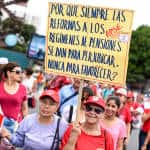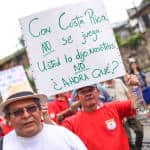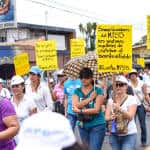Hundreds of public employees from Costa Rican schools, universities and hospitals on Friday morning marched from downtown San José to Casa Presidencial, in the southeast district of Zapote, to oppose government-proposed salary cuts.
The protest was organized by public workers’ unions against several government initiatives, particularly those aiming to reduce salary bonuses as a way to curb the country’s burgeoning fiscal deficit. Costa Rica’s projected fiscal deficit for 2016 is expected to reach 6.7 percent of gross domestic product.
President Luis Guillermo Solís’s administration blames salary incentives and bonuses for a growth in public spending. Most of the benefits were granted three or more decades ago during collective bargaining agreements; now the cost of payments on the national budget exceeds ordinary salaries, finance officials said.
Finance Ministry officials also have proposed tax reforms they say would provide more revenue, but opposition parties in the Legislative Assembly have rejected all of them, insisting the government should focus on cutting public spending.
The Finance Ministry included ₡5.2 trillion ($9.6 billion) for the payment of salaries, extra wage bonuses and benefits in 2016. This represents 49.1 percent of the total national budget for next year, currently under evaluation by the Legislative Assembly.
‘Unjustified’ protest
Labor Minister Víctor Morales said the public protest was unjustified because the current administration is open to dialogue.
Friday’s protest mainly affected those who missed medical appointments and students preparing for final exams.
Some teachers unions also criticized proposed changes in high school programs, saying they would entail budget cuts for public education.
The Social Security System at noon reported that San José’s Hospital México canceled 35 surgeries, while Calderón Guardia Hospital canceled 24. A similar number of surgeries were rescheduled at Monseñor Sanabria Hospital in Puntarenas.
The government’s plan to eliminate extra salary benefits would apply to most public agencies, but only employees of the education and health sectors joined Friday’s march.
Unions from the Costa Rican Electricity Institute, the National Association of Public Employees and the Costa Rican Oil Refinery – among of the country’s largest – recently announced they would hold a similar protest on Oct. 26.
Check out our photo gallery of Friday’s protest:













